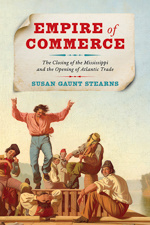Today, we are happy to bring you our conversation with Susan Gaunt Stearns, author of Empire of Commerce: The Closing of the Mississippi and the Opening of Atlantic Trade
What inspired you to write this book?
In graduate school, I came across the Kentucke Gazette. Between 1788 and 1795, nearly every edition contained some mention of the fact that Spain had closed the Mississippi River, and urged some sort of action to reopen the river. The issue was crucially important to the population, but, as a novice historian, I had never heard of the river’s closure. How do you close a river? And why did it matter? It quickly became clear that the river’s closure was bound up in the western land market. Then, in 2008, the housing market crashed, underscoring the pivotal role of real estate in the nation’s political economy. I realized that the river’s closure mirrored the sub-prime mortgage crisis—it challenged how people perceived of land’s value.
What did you learn and what are you hoping readers will learn from your book?
The biggest things I learned were about the relationship between trade and western expansion. I’d always known that Americans were eager to expand westward in search of land, but, I hadn’t really considered the question of how they paid for it. Most western settlers hoped to pay for land using future earnings, which meant that very quickly, they needed to be able to trade whatever they produced in national or international markets. If the federal government wanted to get paid, it needed to see those markets established, too, meaning that western land was bound up in both the national and international politics of the United States. In some ways, this helps remind readers interested in the new history of capitalism that in the 18th and 19th centuries, the United States was overwhelmingly rural. Any picture of the economy that is wholly severed from thinking about land and agriculture is therefore going to be incomplete.
What surprised you the most in the process of writing your book?
I think the thing that surprised me the most was that I started off with a Kentucky project that turned out wasn’t primarily about Kentucky. My research took me to Natchez and Jackson in Mississippi, to Baton Rouge and New Orleans in Louisiana, across Ohio and Pennsylvania, and across the Atlantic to Spain. If I had more time, I would have loved to have explored what archives in England say about trade with the early American west—I am confident that there is much to be found.
What’s your favorite anecdote from your book?
There are several. One anecdote involves the death of a federalist merchant in a duel with Mississippi’s first congressional representative; the merchant’s heir would go on to become one of the wealthiest men in the United States. An anecdote that did not make it into the book features John McDonogh, one of the wealthiest merchants in New Orleans. While alive, McDonogh gained a reputation as a miser—an Ebeneezer Scrooge-esque figure who had far outlived all his friends and aquaintances. When he died, McDonogh donated his fortune to establish public schools for the free children of New Orleans—both white and Black in a bequest that lasted for more than a century. Perhaps the anecdote that will most intrigue readers is the one that begins the book: in 1789, Andrew Jackson, future 7th president of the United States, swore to be a loyal subject of the king of Spain.
What’s next?
I have two projects I’m in the early stages of exploring. One project focuses on k-12 history pedagogy, and the connections between content knowledge and reading ability. My plan is to develop pre-adapted materials that present sophisticated content for students who are working on developing their reading skills. My second project is more historically based. Tentatively entitled “American Spirits: The Political Economy of Alcohol in the Early Republic,” I plan to look into the role of alcohol within the United States’s domestic and international economy. Historians are very much aware of the consumption of alcohol in the 18th and 19th centuries, but alcohol was also big business, forming a cornerstone of both the import and export markets as well as playing a key role in agricultural economies.





